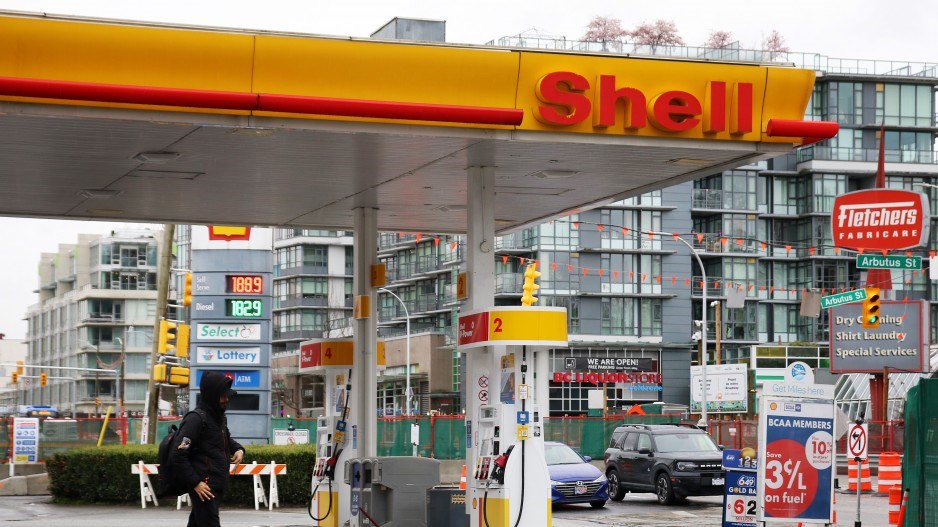Vancouver is slowly losing gas stations throughout the city as the high-value lots on which they sit get rezoned and redeveloped into mixed-use and residential projects.
The province’s push for densification to help address increase housing supply is reinforcing the high property values of Vancouver gas stations, according to James Lang, vice-president at Colliers International. The impact will be continued pressure to remediate and then redevelop a dwindling number of station lots.
“Because all these gas stations are located on arterioles or high-profile locations, there’s such immense pressure on the utility of lands to go vertically and intensify the land that it becomes much more valuable than the operations of a gas station,” Lang said.
The total land value for all self-serve and full-service gas stations in Vancouver is approximately $762.7 million, according to –°¿∂ ”∆µ Assessment data gathered by Glacier Media. This does not include marine, propane and card-lock stations.
The average land value is approximately $12.7 million. This is calculated based on the property’s “highest and best use,” meaning that assessment data reflects the most “probable use of a property that would return the highest value, considering legal, economic and social factors,” according to –°¿∂ ”∆µ Assessment.
The gas station with the highest land value – $36.1 million – is located at the corner of West Broadway and Arbutus Street, an area included in the city’s Broadway Plan, which encourages more housing and amenities along the upcoming Broadway subway line.
“Really, it does not get much more ideal,” said Brandy Burdeniuk, director of ESG, North America for Avison Young, in a statement to Glacier Media.
The push for more transit, as well as transit-oriented development, is influencing decisions about how to use gas station land, according to Lang. And as land values continue to rise, the decommissioning of gas stations for redevelopment is expected to continue.
“There’s increasing pressure for municipalities to increase densities throughout the region to accommodate housing and what I would call these low-intensity, low-use sites are probably under the most pressure,” Lang said.
An example is the decommissioned Chevron gas station at the corner of West Georgia and Bidwell streets. In 2017, the lot was purchased by Anthem Properties in order to be redeveloped into a 33-storey condominium tower, according to the developer.
Previously, it was the second-to-last gas station in Vancouver’s downtown core. Now, only one remains. Owned by Imperial Oil (TSX:IMO), the lot – at the corner of Burrard and Davie streets – is valued at $31 million, according to –°¿∂ ”∆µ Assessment.
According to Burdeniuk, gas stations remain a smart investment opportunity for developers, despite the time and cost involved to remediate, or decontaminate, the underlying soil and groundwater.
“As long as the costs render the development feasible, people will undertake it. For example, in British Columbia, thousands of sites across the province are considered ready to be remediated,” he said.
Remediation is not as expensive as most people might expect, said real estate consultant and developer Michael Geller.
In the mid-1990s, he said he bought a gas station lot at the corner of Larch Street and 41st Avenue in Kerrisdale for the purpose of redeveloping it. The remediation process took roughly two and half years, he said.
“When I bought it, I think I paid the second-highest price per square foot for any residential site in Vancouver, but I still made money,” he said.
The strata building that is now located on that lot, Elm Park Place, features seven storeys and 36 units.
An outstanding question for Vancouver’s remaining gas station lots is whether to incorporate the pumps, or completely redevelop the site.
Geller says that Vancouver can have both: A gas station and housing development on a single lot.
“I do think with some creative design, we can have our cake and eat it too,” he said, adding that the first step would be to rebrand gas stations as “service stations” that may include electric charging and hydrogen fuel.
By 2025, gas stations and commercial pay-parking lots will be required to have electric vehicle charging stations, according to the City of Vancouver. Those that don’t comply will have to pay a higher municipal business license fee of $10,000.
To avoid these fees, gas stations will have to add a minimum of one DC fast charger, the equivalent of 50 kilowatts, and commercial pay-parking lots will have to add at least four Level 2 chargers, each the equivalent of 26.6 kilowatts.
Geller said he believes service stations will eventually no longer exist as single-storey buildings on corner lots: They will be located on the ground floor of a tall mixed-use and residential development.
“I’m old enough to remember when you could not build condominiums above a grocery store,” he said. “They thought no one would want to have to put up with the sound of delivery trucks backing up or just the idea of living above a food store. Today, it’s very appealing.”
Integrating gas stations in this way could help address the concern about how current redevelopment trends will affect the ability to drive a gas-powered car in Vancouver.
“At some point, if we don’t have any gas space, people are going to be running out of gas and blocking traffic,” Geller said.
Glacier Media reached out to the City of Vancouver to ask whether the current council would be concerned if the downtown core lost its last and only gas station, but did not receive a response in time for publication.



